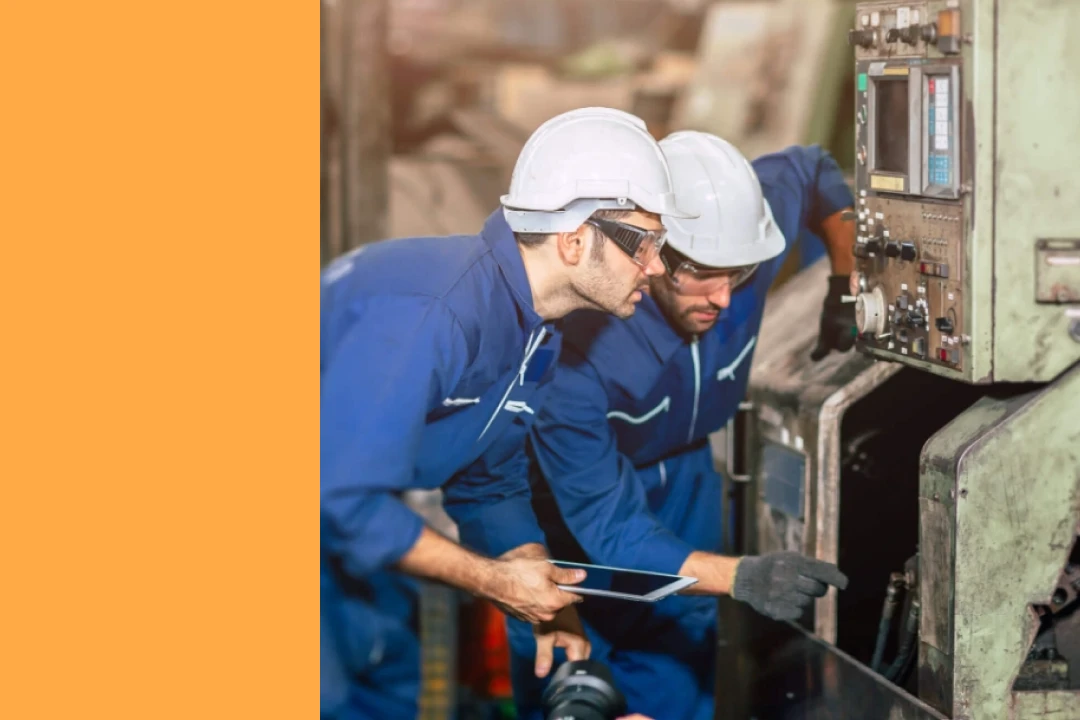
Keeping track of physical assets is more than just an operational necessity—it’s a strategic imperative. Companies are under increasing pressure to maximize asset uptime, reduce maintenance costs, and ensure compliance—all while navigating a market flooded with enterprise asset management (EAM) software options.
With so many choices available, selecting the right EAM software can feel like finding a needle in a haystack. However, finding the best EAM for your organization is key. The right decision can lead to streamlined operations and significant cost savings. For example, MaintainX customers have, on average, seen a 32% reduction in unplanned downtime, 30% savings on monthly maintenance costs, and a 37% increase in mean time between failures (MTBF) due to a proper approach to asset management. The wrong solution, on the other hand, could result in inefficiencies and headaches down the road.
So, how do you cut through the noise and find the EAM solution that's tailored to your organization’s unique needs? Let's dive in.
What is enterprise asset management software?
Enterprise asset management (EAM) software tracks, maintains, and optimizes physical assets across their lifecycle. EAM improves asset performance, reduces downtime, and ensures regulatory compliance. It is used in industries with high-value assets like manufacturing, utilities, and transportation. One key thing to note about enterprise asset management is that it goes beyond simply managing assets for use, and it includes everything from acquisition and maintenance to disposal.
Top 8 enterprise asset management software solutions
On the one hand, a market filled with EAM software options ensures you’ll find a solution that suits your needs. However, cutting through the noise to identify the most useful solution can be a hassle. To help you make an informed decision, we've compiled a list of the top 8 EAM software solutions, highlighting their key features and benefits.
1. MaintainX
MaintainX is an AI-enabled EAM software offering advanced asset management functionality.
Strengths
- User-friendly interface
- Mobile-first approach
- Real-time data capture
- Seamless integration with ERP systems
- Robust support and training
Unique Features
- AI-powered anomaly detection
- AI-powered workload-based scheduling
- AI-powered procedure generator
- Global parts management
- SAP integration
- Comprehensive reporting and advanced analytics
2. UpKeep
UpKeep is a CMMS that streamlines work order management, centralizes data, and enables maintenance and asset management.
Strengths
- Mobile-first design
- User-friendly interface
- Affordability for small to mid-sized businesses
Unique Features
- Mobile work orders
- Asset tracking
- Maintenance scheduling
- Integration with IoT devices
3. Fiix
Fiix is a CMMS offering IoT integration, predictive analytics, and scalable asset management for organizations.
Strengths
- Cloud-based platform
- Strong focus on maintenance management
- User-friendly interface
Unique Features
- AI-powered insights
- Integration with various business systems
- Strong mobile capabilities
4. Asset Panda
Asset Panda is a cloud-based asset management platform that offers customizable tracking, maintenance scheduling, and mobile accessibility.
Strengths
- Flexibility
- Ease of use
- Affordability
Unique Features
- Customizable asset tracking
- Mobile app with barcode scanning
- Robust reporting capabilities.
5. Oracle EAM
Oracle EAM is an enterprise asset management solution that provides comprehensive tools for asset lifecycle management, maintenance, and predictive analytics.
Strengths
- Integration with Oracle’s extensive suite of business applications
- Scalability
- Robust analytics
Unique Features
- Comprehensive asset lifecycle management
- Integration with Oracle Cloud
- Advanced predictive maintenance capabilities
6. Infor EAM
Infor EAM is an enterprise-grade asset management solution designed for large-scale operations.
Strengths
- Cloud-based solution
- User-friendly interface
- Strong mobile capabilities
Unique Features
- Advanced asset tracking
- Predictive maintenance
- Integration with IoT devices for real-time monitoring
7. IBM Maximo
IBM Maximo is an enterprise asset management solution that leverages AI and IoT to enable advanced asset lifecycle management.
Strengths
- Comprehensive asset management capabilities
- Strong integration with IoT and AI
- Extensive customization options
Unique Features
- Advanced predictive maintenance tools
- Integration with IBM Watson for AI-driven insights
- Extensive industry-specific solutions
8. SAP EAM
SAP EAM is a robust enterprise asset management system integrated with SAP ERP, offering real-time monitoring, predictive maintenance, and asset optimization.
Strengths
- Strong integration with other SAP modules
- Comprehensive asset lifecycle management
- Scalability for large enterprises
Unique Features
- In-depth asset performance management
- Integration with SAP’s broader suite of ERP tools
- Robust analytics and reporting
How to choose the best enterprise asset management system for your needs
With a clear view of the top EAM solutions in the market, how do you figure out which one is right for you? Features are only one part of the equation and, to help you make the right choice, we’ve outlined key steps to follow for anyone looking for EAM software.
Assess your organization’s needs & objectives
Before even looking at features, it’s important to define what you need from an EAM system. Are you aiming to reduce maintenance costs? Or are you looking to implement a broader maintenance program that improves asset reliability and lifespan while streamlining operations? Understanding your goals will help you identify the features that matter most for your business.
Evaluate core features
As you’ll have noticed, not all EAM systems are created equal. With your business goals in mind, look for the key functionalities and features that align. In general, crucial features you shouldn’t compromise on are real-time monitoring, inventory management, and reporting capabilities.
Consider user-friendliness
A system with all the right features is only valuable if your team can use it effectively. Choose software that is intuitive and easy to navigate, minimizing the learning curve for your staff.
Look into vendor support and training
In addition to user-friendliness, ensure that the system you choose offers full support and comprehensive training to help you succeed through implementation and beyond.
Check integration capabilities
Because EAM focuses on the entire lifecycle of an asset, you need a clear view of your overall operations, from maintenance to finance. That means integration with your existing Enterprise Resource Planning (ERP) system is crucial. This ensures smooth data flow across your organization, avoiding data silos and enhancing overall operational efficiency.
Evaluate scalability and flexibility
As your business grows, your asset management needs will also evolve. You don’t want to be in the position of having to acquire new systems whenever your business needs change. Choose a system that can scale with your operations and adapt to future changes. For example, Future Foam started by integrating MaintainX at just four sites. After seeing success in those four original sites, Future Foam then deployed the software across 22 locations, going from 7,600 work orders and 5,000 parts to over 19,000 work orders and over 53,000 parts—in under two years.
Analyze the total cost of ownership
When considering the cost of an EAM, analyze not just the upfront payments but also any long-term spending associated with licensing, implementation, training, and maintenance. Understanding the total cost of ownership will help you make a more informed decision that aligns with your budget.
Case Study: Future Foam reduces reactive maintenance by over 30% through better data and visibility with MaintainX
Transform your enterprise asset management today with MaintainX
Whatever your industry, finding the right partner to help execute your asset management strategy is crucial to ensure asset availability, optimize spending, and boost efficiency. MaintainX is an enterprise asset management solution that helps you manage, track, and analyze your assets—all at a lower total cost of ownership than other options. Here’s how:
Digital work orders
- Create and assign work orders in one centralized system.
- Track work orders through all stages and share real-time updates and feedback.
- Provide work instructions and digital SOPs to ensure technicians perform work accurately.
Native mobile app
- Give your technicians access to work orders, asset information, and inventory data on the go.
- Improve work order quality by capturing more data from the floor.
- Increase safety compliance rates by enabling SOP access from anywhere.
- Boost communication and collaboration by enabling updates from the field.
Maintenance scheduling
- Schedule preventive maintenance in advance and ensure nothing slips through the cracks.
- Use notifications to ensure technicians perform maintenance tasks on time.
- Conduct preventive maintenance according to asset usage and trigger condition-based maintenance using meter data.
- Use workload-based scheduling to shift maintenance work orders between technicians and ensure assets stay running.
Asset & equipment management
- Monitor asset performance and health in real-time.
- Establish asset hierarchies and define criticality levels to ensure proper maintenance prioritization.
- Easily locate assets in facilities by assigning them to specific locations.
- Better enable lean 6S and TPM implementation with one-point lesson visual inspections and auto-corrective actions.
Reporting & analytics
- Access out-of-the-box reports to track KPIs and monitor asset health.
- Customize dashboards to track preferred metrics and analyze asset data.
- Identify areas for improvement to optimize maintenance operations and enhance operational efficiency.
Parts inventory management
- Get automated low-stock alerts to ensure you replenish on time, minimize downtime, and avoid expensive rush orders.
- Associate parts with assets and locations to see stock levels across your entire operation.
- Synchronize parts data and purchase orders with your ERP to streamline reordering.
Enterprise asset management software FAQs
What is the benefit of using asset management software in my business?
Using asset management software in your business provides better control and visibility over your physical assets, leading to improved efficiency, reduced downtime, enhanced supply chain management, and greater cost savings. It enables proactive maintenance, accurate tracking of asset performance, and data-driven decision-making, ensuring your assets operate at peak performance.
Why is asset management software so effective?
Asset management software is effective because it centralizes asset data, automates routine maintenance tasks, and provides real-time insights into asset health. This allows businesses to predict and prevent equipment failures, optimize maintenance schedules, and properly manage their finances. Organizations with robust asset management programs can increase production capacity, extend their asset lifecycles, reduce costs, and boost overall efficiency.
What is the difference between CMMS and EAM software?
A Computerized Maintenance Management System (CMMS) focuses primarily on managing maintenance activities, work orders, and scheduling. In contrast, EAM software offers a broader scope and covers the entire asset lifecycle, from acquisition and maintenance to disposal, and includes additional features like inventory management, compliance tracking, and resource planning.
How can EAM and ERP software work together?
EAM and ERP software can work together by seamlessly integrating to provide a comprehensive view of both operational and financial aspects of asset management. This integration allows for synchronized data sharing, streamlined processes, and improved financial management, ensuring asset management strategies align with the overall business objectives.








_%20Ranking%20the%20Top%20Vendors-1080x720.webp)
